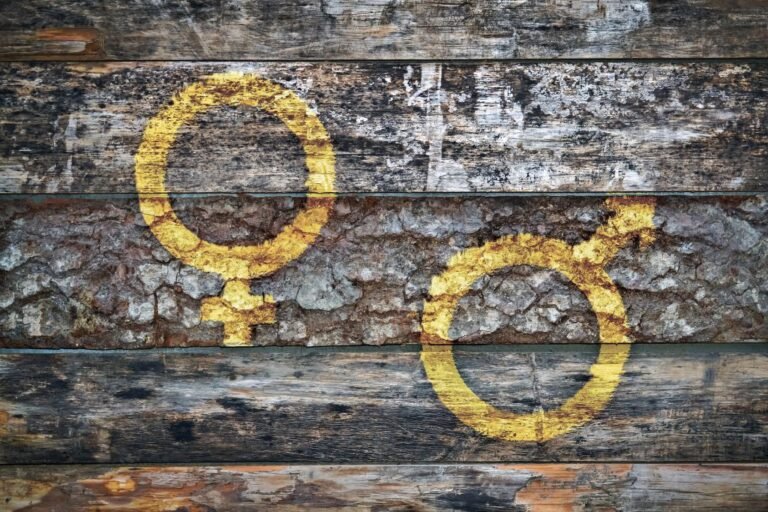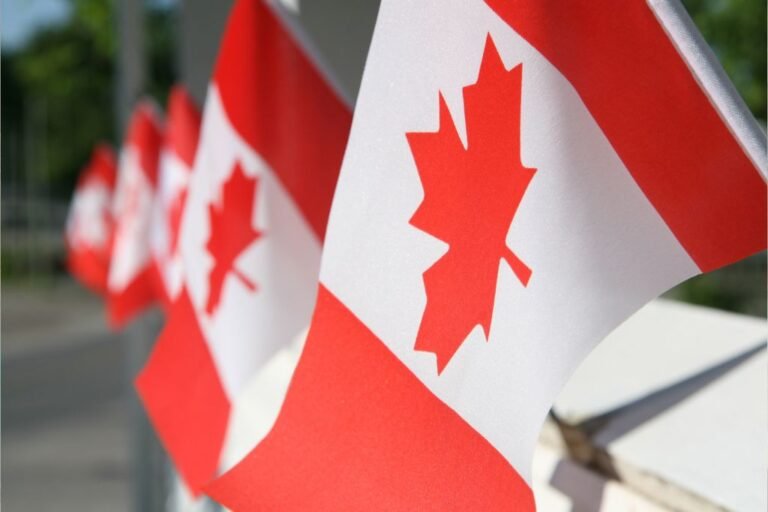Help Stop the WHO Treaty Plans
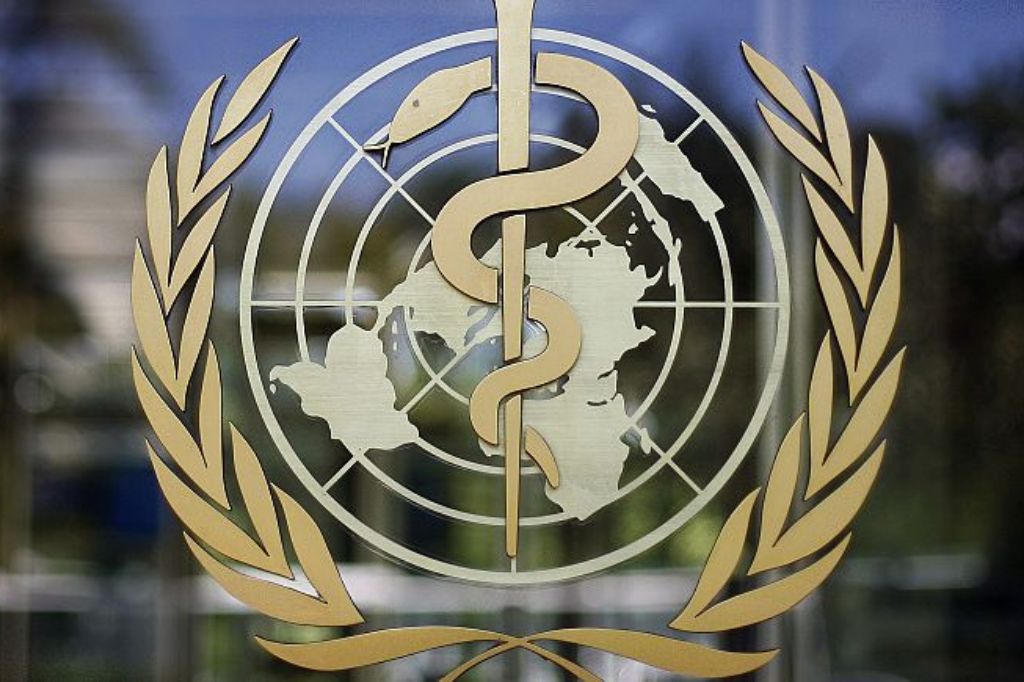
NZDSOS’ concerns about the plans of the World Health Organisation to amend their existing International Health Regulations and impose a new WHO Treaty are well documented and shared by our multiple local and international alliances. This is a potentially confusing topic and as the threat advances, with New Zealand representation involved, this article aims to make further sense of the issue.
Who Are WHO?
Formed from the ashes of World War 2, the intended remit of the United Nations was to secure “peace, dignity and equality on a healthy planet“. Health and wellbeing are essential features of security, and in 1948 the World Health Organisation was established as a specialised agency within the United Nations, providing global health support and advice to nations with the aim of achieving “health for all“.
With headquarters in Geneva, Switzerland, WHO consists of 194 member states divided into six geographical regions.
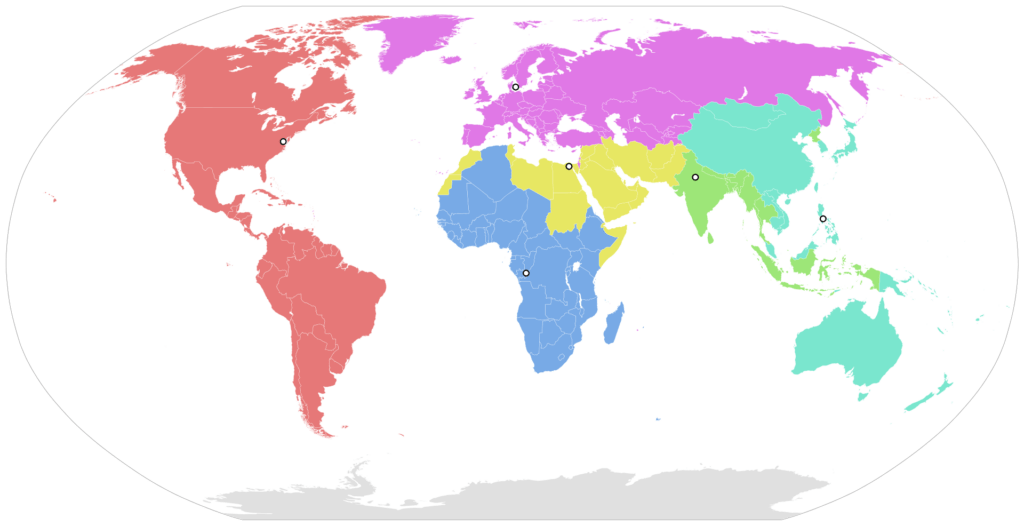
The organisational structure is headed by a Director-General: currently Tedros Adhanom Ghebreyesus from Ethiopia, whose second term began in August 2022. This is an elected position serving as chief technical and administrative officer. The governing body of WHO is the World Health Assembly (WHA) who meet each year in May to determine and review policies, where each member nation has one vote.
An executive board consisting of elected health-qualified experts acts as the technical advisory group to the WHA. The structure and function of the executive board is described in Chapter VI, Articles 24-29 of the Constitution.
Legal documents guide the work of WHO, including the Constitution, which is underpinned by principles laid out in the Universal Declaration of Human Rights and the Nuremberg Code. Clear ethical limits are set, within which disease control measures may be instituted, including respect for individual autonomy and freedom of thought, expression and movement.
New Zealand’s Association With WHO
According to the First WHA Plenary Session records (page 52), New Zealand was the fifth nation to ratify the WHO Constitution. We are represented at the WHA each year, and we also have delegates involved in extraordinary sessions and other committees outside this schedule. As records from the 75th WHA in May 2022 show (see pages 38-39), our representation seems to come from the Ministry of Health and New Zealand’s Permanent Mission to the United Nations.
New Zealand sits within the Western Pacific Region, made up of 37 member states or areas, 28 of whom receive support and 15 of whom have country offices. Our regional office (WPRO) is in Manila, Philippines and the NZ representative office is in Suva, Fiji.
In the two years of 2020-2021 New Zealand contributed a total of $10,394,000 to WHO, of which 73.21% was specified voluntary contributions and the remainder was membership fees, known as assessed contributions. Our contributions were distributed to the WPRO (66.65%), Papua New Guinea (31.02%), Solomon Islands (1.78%) and Vanuatu (0.55%).
How Are WHO Funded
The original funding concept for WHO relied upon assessed contributions from member states, calculated on national gross domestic product. In the past two decades this has evolved such that specified voluntary contributions (private, corporate and government donors who make contributions for specified projects) now make up 76.81% of the annual budget. This has shifted control over organisational priorities and policies to donors with vested and financial interests, including many private donors from non governmental and corporate sectors.
An experienced WHO pandemic preparedness scientist Dr Astrid Stuckelberger has described today’s funding structure as “a huge ponzi scheme“. Ex-WHO and Gates Foundation employee, public health physician/scientist Dr David Bell has described the process of WHO funding evolving to a public-private partnership structure and the influence this has over organisational priorities. “You end up doing what the donors want and not what the people need “.
Proposed Changes
Plans are currently underway to make significant changes to the legal framework within WHO. This is occurring via two separate tracks: introduction of a new law, commonly referred to as the ‘WHO Treaty’ but officially named the WHO CA+ (WHO convention, agreement or other international instrument on pandemic prevention, preparedness and response); and proposed amendments to the existing International Health Regulations. The purpose of both tracks is essentially the same: to increase the powers of WHO, in particular the Director-General; remove democratic protections of sovereign states to determine their own health care systems; and to impose a biosecurity industry focus on health services.
The proposed changes include “One Health“, a collaboration between four UN agencies intending to apply biosecurity governance over human, animal, plant and environmental “health”. Examples in which this concept is already obtaining attention include:
- last week’s announcement by Tedros Ghebreyesus, that avian influenza has been detected in mammals including sea lions, foxes, minks and otters;
- claims that climate change is to blame for health emergencies, whilst ignoring the fact that poor infrastructure, a feature of poverty, makes people extremely vulnerable to weather events;
- plans, including in New Zealand, to impose regulation over natural plant products;
- claims that the One Health approach will help tackle antimicrobial resistance, which is in fact caused by the use of antibiotics in livestock feed to promote growth.
The Proposed WHO Treaty
Many different names have been given to the proposed WHO Treaty, including ‘instrument’, ‘accord’, ‘agreement’ and ‘convention’. The new title in official documentation is “WHO CA+”, meaning “convention/accord plus”, alluding to the various names which have been used. The claimed intent of the WHO Treaty is to “strengthen pandemic prevention, preparedness and response“.
Pandemics are in fact extremely rare, killing far fewer people than many other diseases from which program resources will be removed. Research published by Anthony Fauci in 2008 showed that deaths attributed to the Spanish Influenza of 1918 were in fact predominantly the result of bacterial pneumonia in the pre-antibiotic era, making the chances of this happening again highly unlikely.

However, the opportunity to halt social and economic activity in the name of protecting health, and to convince populations that mass vaccination is a necessary intervention, leads to one of the most profitable human endeavours ever seen. A 2022 Oxfam report Profiting from Pain describes the surge in billionaire wealth simultaneous to the cost of living crisis caused by the Covid-19 response.
Sitting beside WHO’s new Chief Scientist, billionaire Jeremy Farrar at the World Economic Forum in May 2022, Oxfam’s Executive Director Gabriela Bucher stated “every 30 hours a new billionaire was minted during the pandemic“, whilst every 33 hours 1 million people were pushed into extreme poverty. As a leading part of this system, WHO no longer focuses on addressing needs of the most vulnerable populations, but on obtaining profits from populations where the biggest gains can be made. This ignores the capacity for such countries to manage their own health services without interference.
The treaty continues to be drafted by an appointed Intergovernmental Negotiating Body (INB) acting as a subdivision of the WHA. The next INB meeting is planned for the week of 27 February 2023. Meeting attendees are reported to have signed a confidentiality clause and the general public have no access to proceedings.
Once in place the WHO Treaty will be a legally binding obligation between an unelected body now acting as a private entity, and any nation state who signs the agreement. Upon declaration of a pandemic – the definition of which is determined by WHO and may include merely a “potential risk”, associated with the “One Health” concept – executive powers over nation states will be granted to WHO.
In May 2022 MEP for Germany, Christine Anderson, delivered a concise summary of why this plan should concern every citizen of every democratic nation. At last week’s World Council for Health general assembly, James Roguski delivered a short video outlining his main reasons for opposing the WHO Treaty. He has studied the WHO documents closely, and updates his excellent substack regularly, including links to the many interviews he gives, making sense of the issue and providing solutions. His Top Ten Reasons to Stop the WHO Treaty are:
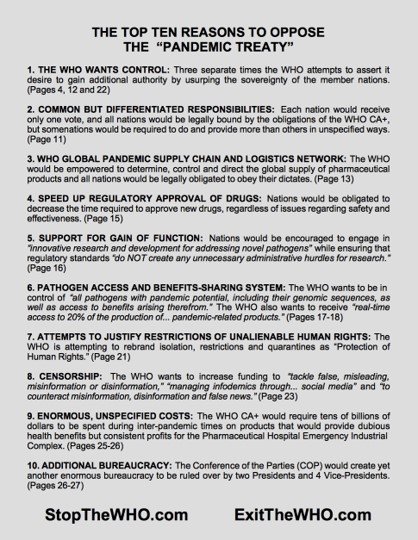
Proposed Amendments to the International Health Regulations
One remit of WHO since their inception has been issuing advice about control of infectious diseases across borders. Initially guided by International Sanitary Conventions, these were updated to International Health Regulations (IHRs) in 1969. These focused on specific infectious diseases, starting with six diseases of concern, which reduced over time as concerns dissipated. For example Smallpox was removed from the list after its official eradication was declared in 1980.
In 2003 the first SARS pandemic awakened concern about international spread of disease, leading to the 2005 IHR revision which includes an algorithm for a Public Health Emergency of International Concern (“PHEIC”), which is not disease-specific. The 2005 IHRs hold true to WHO’s original principles of human rights, limiting what restrictions can be placed on freedom of human movement and trade.
Unlike the WHO Treaty, proposals to amend the IHR (2005) involve making changes to an existing international law. This makes the IHR amendments a slightly less complicated process and whereas the WHO Treaty will require a vote in favour from 75% of the WHA, the IHR amendments only require a 50% vote in favour.
The current proposals for amendments to the IHR (2005) largely remove the principles of democracy, human rights and freedoms which underpinned WHO’s original priorities, replacing them instead with powers analagous to those being proposed in the WHO Treaty. Some of the proposed wording in the IHR amendments is extremely concerning, with WHO’s role changing from “advisory” to “legally binding“; and removal of the words “respect for dignity, human rights and fundamental freedoms“. These are two of many examples which suggest a plan for tight top-down global control over populations whose rights and freedoms are at risk of complete dissolution.
The IHR amendments are progressing through two separate groups: the IHR Review Committee and the Working Group on Amendments to the IHR (WGIHR), who are meeting next week to further advance the draft document. Again, one of the best resources to help with understanding the IHR amendments is James Roguski due to his thorough investigations and frequent communications to the public.
Roguski provides Top Ten Reasons to Stop the International Health Regulations Amendments. A significant number of these changes have been contested by the Review Committee, but they remain of potential concern until such time as they are definitively rejected.

How Can We Stop the WHO Treaty and IHR Amendments?
The situation is not hopeless and there are many things we can do. With enough opposition to this power grab, the WHO Treaty and IHR amendments can both be halted. Ways to help include:
- Get informed. Refer to the resources we have shared above. All relevant WHO documents and information are available via James Roguski at Stop the Global Agenda.
- Become familiar with which of our rights are under threat and spread the word to friends, family, colleagues and anyone who will listen.
- Write to, or arrange to meet with, your MP, to express your concerns.
If you think there are better ways to contribute to global health, ask that your representative advocate for New Zealand to exit as a member state within WHO.
Find your MP’s contact details here. - Contact New Zealand’s WHO representatives.
- New Zealand’s WHA 2022 representatives are found at pages 38 and 39 of the Provisional List of Delegates and Other Participants. They include Ministry of Health representatives: Andrew Little, Lisa Petraschuk, John Whaanga, Ashley Bloomfield, Gerardine Clifford-Lidstone and Lucy Cassels; and NZ Permanent Mission to the United Nations representatives: Lucy Duncan, Nathan Glassey and Clare van Bohemen Hunter.
- Andrew Forsyth, Manager, Public Health Strategy, NZ Ministry of Health, represents New Zealand on the IHR Review Committee. Email [email protected]
- Ashley Bloomfield represents New Zealand on the WGIHR. Email [email protected]
- Go to ScrewTheWHO to learn about ways to publicly oppose the WHO Treaty and IHR amendments.
- Record a video of yourself stating why you oppose your representatives signing the WHO Treaty or IHR Amendments without approval via a public referendum.
- Upload the video at World Council for Health (click on Submit Your Video Now)
- Send the video to your MP and / or New Zealand’s WHO delegates.
It is up to each of us to take action, no matter how small. Failure to do this risks our personal and national sovereignty, and indeed the freedom of peoples across the world. #sos


